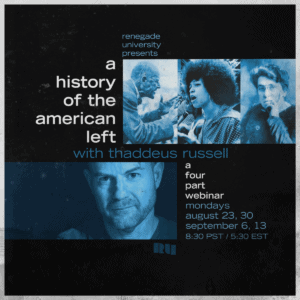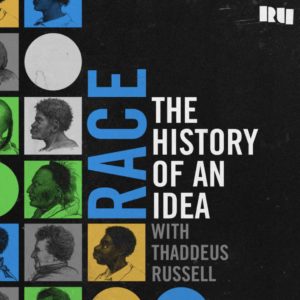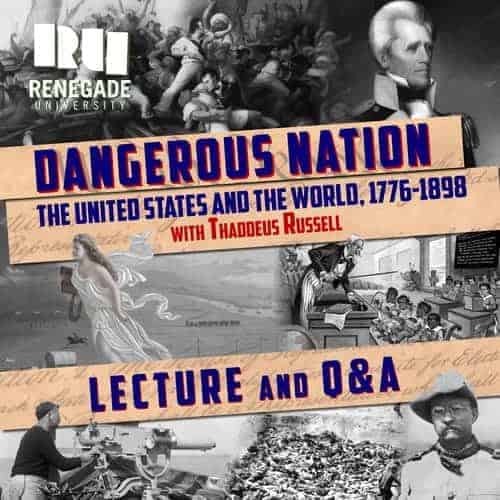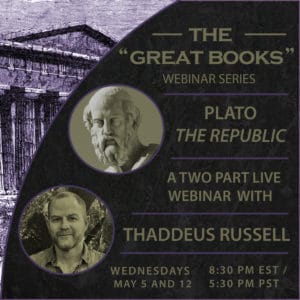All rights reserved. Copyright © 2019 Renegade University

Thad Russell Bundle
In the RU Thad Russell Bundle, you’ll take a romp through the thought of RU founder, Thaddeus Russell. Covering culture, history, and philosophy, this bundle provides a well-rounded liberal education from one of the most renegade thought leaders active today.
$490.00
Included in This Bundle

A Renegade History of the United States
Thad’s flagship course, based on his best selling book of the same title, provides a cultural history of the United States from the point of view of societal outcasts, victims of discrimination, and even enslaved people. Far from the victimology of similar books, however, this course celebrates the contribution these downtrodden people made to American—and global—culture.

A History of the American Left
This course examines the history of the political and intellectual movement that is now at the heights of American culture. Though the great majority of Americans do not identify as radical or left-wing, what is called “the left” has taken commanding positions in many parts of American society.
Since the 1930s, socialists, communists, and social democrats have controlled many of the major labor unions in the United States, and with that power have continued to exert influence over American electoral politics. Since the 1960s, the left has dominated academia, and few college graduates have not been exposed to the ideas of Marxism, radical feminism, or critical race theory.
We begin the course with an analysis of the intellectual origins of the modern American left, including Rousseau and the French revolution, Marx and “scientific socialism,” Eugene Debs and Christian socialism, “2nd-wave” radical feminism, and the anti-racism of the abolitionist, civil rights, and Black Lives Matter movements.

Race: The History of an Idea
In this course, you’ll be guided by Thaddeus Russell in an examination of the origins of the idea of “races” of human beings in the United States. The concept of “race”, largely a fictional concept, was deployed over two centuries in efforts to conquer, exterminate, civilize, and assimilate various “races” of people both inside the U.S. and across the world. This is the history of a concept.

Dangerous Nation: The U.S. & The World, 1776-1898
The United States of America became a globalist empire not with the Spanish-American War in 1898, as most textbooks tell us, but with its founding. The Declaration of Independence asserted that “the People” possessed both a right and a “duty” to overthrow oppressive governments and to “provide New guards for their future security.” This idea famously justified the American War of Independence, but it was also interpreted by subsequent political leaders of the United States as an injunction to forever expand what Thomas Jefferson called the “empire of liberty.”
This course presents an argument that globalist, imperialist ideas were embedded in America’s founding philosophy and that they were carried out in all the military endeavors of the U.S. in the 19th century, from Jefferson’s campaign against the “Mohammedan” pirates of the Mediterranean to Jackson’s crusade to “civilize” the West and Lincoln’s conquest and “reconstruction” of the South.

World War II: The Great Blowback
Americans are skeptical of all but one of the foreign wars of the United States. It is widely accepted among both historians and the knowledgeable public that the Spanish-American War, World War I, the Korean War, the Vietnam War, and the Afghanistan and Iraq wars were either colossal “mistakes” or acts of imperialist aggression. The Second World War remains the only “good war.” Indeed, it remains the only sacred war.
In the United States, it is still impossible to call into question the virtue of this country’s participation in the global war of 1939 to 1945 without being dismissed or castigated as a Nazi sympathizer, Holocaust denier, conspiracy theorist, or crank. And yet over the last two decades, academic historians in Europe have begun to assemble recently discovered evidence into a new narrative in which the policies of the United States during Franklin Roosevelt’s presidency are a principal cause not only of the military conflicts in Asia and Europe that killed more than 60 million people but also of the deaths of six million Jews inside the Third Reich.
In this course we will do what very few American historians of World War II know or dare to do. We will examine the emergent, revisionist history and determine whether it is now plausible to argue that America’s “good war” was actually America’s greatest blowback.

The Great Books: Plato, The Republic
No text other than the Bible has been as influential in the history of Western civilization as Plato’s The Republic. Written around 380 BC, The Republic raises and offers answers to all the major questions that still occupy philosophers and political theorists. Readers new to the text are often amazed at how much of their culture they see being created in the series of dialogues between the character of Socrates and his interlocuters. Anyone raised in the West will recognize in the text many of the central precepts of their world.
The Republic addresses the meaning of justice, the characteristics of a good society, the proper relationship between the individual and the community, the problems with democracy, the function of art, the consequences of greed, the best education for each class of person, the basis of morality, and the very nature of truth.

What is Postmodernism?
Many activists use the language of postmodernism in their calls for “social justice.” Others say that postmodernism is destroying our civilization and will enslave us all. In this course we will do what very few people on either side of the postmodernism controversy seem to have done: examine the texts that are associated with the notorious philosophy.
You’ll gain an understanding of the major arguments in the most famous works of Jacques Derrida, Michel Foucault, and other postmodernist philosophers, and you’ll have new ways of thinking about the questions they raise.
$490.00
